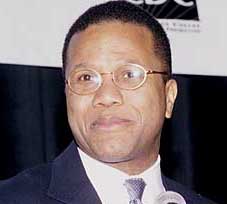-
- San Diego chapter of CHAANGE holds community forum Nov. 19
- SAGE victims of Western Union scam
- The Center and Family Matters unite to help GLBT families affected by fires
- SummerQuest 2003: big names, big dollars, poor returns
- Gay African-American mayor elected in Palm Springs
- Nominations deadline for SanDie Awards is here
- Community News
-
- Fundamentalists attack studies of sexual activity
- Mass. legislators negotiating gay rights compromise
- Gay Methodist minister likely to face church trial
- Appeals nominee Allen faces questions
- Plaza chosen as Ten Commandments monument solution
- Gay teen sues Jupiter Christian School
- Court refuses to take case on sexual orientation
- Gay music director steps down after ultimatum
- National News Briefs
- World News Briefs
national
Appeals nominee Allen faces questions
Many troubled by his years working with Helms
Published Thursday, 06-Nov-2003 in issue 828
WASHINGTON (AP) — Federal appellate nominee Claude Allen told a Senate committee he didn’t mean it as a slur against homosexuals when he used the word “queer” while working as a press aide to a conservative Republican senator.
Allen also said he was “conflicted” about the 1983 filibuster mounted by his then-boss, GOP Sen. Jesse Helms of North Carolina, against a proposed federal holiday for the Rev. Martin Luther King Jr.
“It was the most difficult day for me in my life,” said Allen, who could become the second black appeals judge on the 4th U.S. Circuit Court of Appeals, if confirmed. “I believed that Dr. King deserved a holiday.”
Now deputy secretary at the Health and Human Services Department, Allen said that when a North Carolina reporter quoted him as using the word “queer” while he was Helms’ press secretary during the senator’s 1984 re-election campaign, Allen said he meant it in the sense of “odd, out of the ordinary, unusual” instead of a slur for homosexual.
During Helms’ campaign against former North Carolina Gov. Jim Hunt, Allen was quoted as saying Hunt was vulnerable because his campaign could be “linked with the queers.” He also was quoted as saying the Hunt campaign could be connected with homosexuals, labor unions, radical feminists and socialists.
Allen immediately apologized for anyone who misunderstood him, he told the Senate Judiciary Committee.
“I don’t believe that we should use words that are pejorative in nature,” Allen said. “I teach my children to have respect and treat people with the very same dignity that they want to be treated with.”
The Richmond, Va., court, which hears federal appeals from Virginia, Maryland, West Virginia, North Carolina and South Carolina, serves a population that is about 22 percent minorities, the most of any circuit. The number of judges on the 15-member court from each state has historically been proportionate to that state’s population.
But after Democrats blocked a Helms nominee, the North Carolinian known as “Senator No” refused to allow any of President Clinton’s judicial nominees from North Carolina on that court.
Clinton finally got around Helms’ blockade by nominating Roger Gregory of Virginia, who became the first black judge on that circuit but took what was considered to be a North Carolina seat. Helms has since retired.
Maryland’s two Democratic senators have not been able to come to an agreement with President Bush on a Marylander for that court, so Bush also has nominated a black Virginian — Allen — for that seat.
“The administration is seeking to shift the seat that should be a Maryland seat to another state. That’s what it is, plain and simple,” Sen. Paul Sarbanes said. Added Sen. Barbara Mikulski: “A state with 20 percent of the population should have 20 percent of the seats. That’s three seats on a 15-member court.”
GOP Sen. John Warner of Virginia pleaded with the Marylanders not to filibuster Allen because of their fight with the White House. “Do what you can to the White House but not to this individual,” he said.
“We have tried with the administration. We have stated this case forcefully to them,” Mikulski answered.
“I don’t question that you fought a strong battle,” Warner said. “But my point is, you lost. And now we’re in another arena.”
But Sarbanes said they won’t give up trying to block Allen. “We don’t intend to lose in this arena,” he said.
|
|
Copyright © 2003-2025 Uptown Publications


